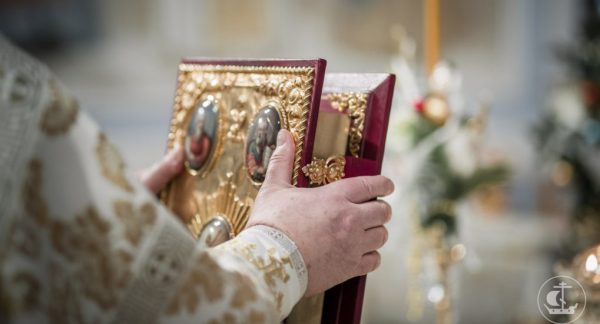The word of the day is “so.” Nowadays, people are disposed to believe many things with little evidence to confirm them. Yet when it comes to religion, doubt, cynicism, and indifference to the truth prevail. Today in our reading of Acts 6:8-7:5; 47-60, the apostles face the Jewish council. And the high priest asks, “Are these things so? (OSB vs. 7:1).
Just as the Jewish officials and Pilate demanded that Jesus answer the false accusations against Him (Matthew 27:12; Mark 15:4), the temple authorities challenge Stephen to answer the false charge of his opponents (vs. 7:1). But there is a deeper question behind the challenge, “Is it “so”? Is what Stephen is saying and doing true? In today’s study, we will highlight the evidence that confirms the truth of Stephen’s witness to the faith. And we will ask what might confirm the truth of our faith today?
The Historical Background of Hellenistic Judaism
One historical factor lies behind today’s study. Stephen and the other deacons that the apostles ordained in Chapter 6 were Hellenists. Further, the synagogue where Stephen disputed the truth of the Gospel was Hellenist. As we observed yesterday, the Hellenists were Jews who were not from Judea. For instance, the name of the synagogue in today’s passage indicates that its membership was composed of freed slaves (“Freedmen”) from Cyrene, Alexandria, Cilicia and Asia (OSB vs. 9). This group in the early church had adapted to Greco-Roman ways, adopted the Greek language, and were distinct from the more conservative party who were from the Holy Land and who spoke Hebrew and Aramaic.
This background is significant since it confirms Luke’s earlier report that “They were all filled with the Holy Spirit and spoke the Word of God with boldness” (OSB Acts 4:31). Accordingly, we find that the apostles were not the only ones to perform “signs and wonders” since Stephen was not an apostle, not even a Judean and native Hebrew speaker.
Proclamation Not Limited to the Apostles
Moreover, the apostles were not the only ones with authority to preach the Word, for Stephen powerfully “disputed” with the Jews in the synagogue. In Greek, the word “dispute” means to “consider together.” But in this case, it meant to “encounter” or “attack” (#4820, 238). We can presume that the conflict was waged in Greek. If so, then Luke’s report would be the first evidence of the use of the Greek language to communicate the Gospel. As we will soon discover, this finding is critical, because the Hellenistic Jews were the bridge from the limited Jewish circles to the outreach to the pagans in the entire Roman Empire. By such conversations, the teachings of and about the Lord, once given in Aramaic and Hebrew, were translated into the Greek. And this is the language of the New Testament.
The Confirmation of the Words and Acts of Stephen
But were the things that Stephen was preaching and doing “so”? Luke reports that Stephen did many “signs and wonders.” These acts of “faith and power” were confirmation that the Holy Spirit was empowering the deacon. And the Holy Spirit is the Spirit of truth. Further confirmation of the veracity of his testimony was his wisdom, wisdom that no one was able to refute.
Finally, the Lord had ascended into heaven before the eyes of the apostles. But Stephen was given to see the Risen Lord in heaven “standing at the right hand of God,” standing to receive the martyr into His presence (OSB vs. 55). We do not doubt this affirmation of Stephen’s testimony because Luke reports that Stephen had openly spoken of what he saw. But this vision gives evidence that the Almighty God approved of his witness from His throne in heaven (OSB vs. 55). If the Almighty God endorsed it, it must be true.
In summary, several things in this narrative attest that the things that Stephen said and did were “so:” the signs and wonders that Stephen performed, the incontestable wisdom of his proclamation, and his vision of the Son of Man standing at the right hand of the Majesty of God.
For Reflection
Yet this narrative prompts us to ask about the confirmation of our faith. What is the evidence that what we believe is true? We might say that its truth is proven in miracles, answer to prayer, powerful spiritual experiences, the historical weight of Holy Tradition, the continuity of the teachings and life of the church, the sincerity and conviction of our teachers, the beauty of our worship, or just an inner conviction.
But we might add one thing that Luke mentions later in Acts. He reports that those in the synagogue of Berea were more “fair-minded” than those in Thessalonica. You see, Luke says that they “received the word with all readiness and searched the Scriptures daily to find out whether these things were “so” (OSB Acts 11). Luke observes that the Bereans were “nobler” than their counterparts (Strong’s #2104, 104). They received the Word with “readiness.” That is, they were disposed to consider it (Strong’s #4288, 211) and willing to examine the evidence for the claims of the Gospel.
Where To Look for Evidence of the Truth
But where did they look for evidence? Day by day they “searched the scriptures” (OSB 17:11). We might say that they compared the Scriptures to Paul’s witness to Christ point by point. And by that comparison, they were convinced of the truth of the Gospel. The correspondence between the witness of the church and the prophecy of scriptures provided them with the “evidence of things not seen” (Hebrews 1:11).
Recall that when the Risen Christ appeared to the disciples on the way to Emmaus, He “interpreted in all the scriptures, the things concerning Himself” (OSB Luke 24:27). This incident suggests that the Risen Lord Himself taught the church to find Him and His work of salvation foretold in the scriptures. Thus, we find in the Nicene Creed that the fulfillment of scripture confirms the essential point of our faith. We confess, “And He was crucified for us under Pontius Pilate, and suffered, and was buried. And the third day He rose again, according to the scriptures.”
Moreover, the apostle Peter says that he and the other disciples were “eyewitnesses of His [Christ’s] majesty” (2 Peter 1:16). Besides that, they heard the voice of the Father that affirmed that Jesus is “My Beloved Son” (2 Peter 1:18). But then the apostle comments, “And so we have the prophetic word confirmed, which you do well to heed as a light that shines in a dark place” (2 Peter 1:9). In other words, what the disciples saw and heard was the fulfillment of the Word of the prophets. And this accomplishment of the expressed will of God testified to the truth of what they experienced.
Finding Confirmation in the Fulfillment of the Scriptures
In the fulfillment of the scriptures, we have evidence that all that Jesus did and taught was in accord with God’s plan. And all that the disciples saw and heard agreed with the will God. This evidence and our faith mutually support one another. The correspondence between the scriptures and the testimony of the church is evidence that confirms our faith. And our faith believes this evidence.
Thus, one of the primary ways to strengthen our faith in Christ is to search the scriptures, finding in them the confirmation of the truth of our faith. We may do that by discovering how the will and ways of God are fulfilled in the Lord’s work of salvation.

















